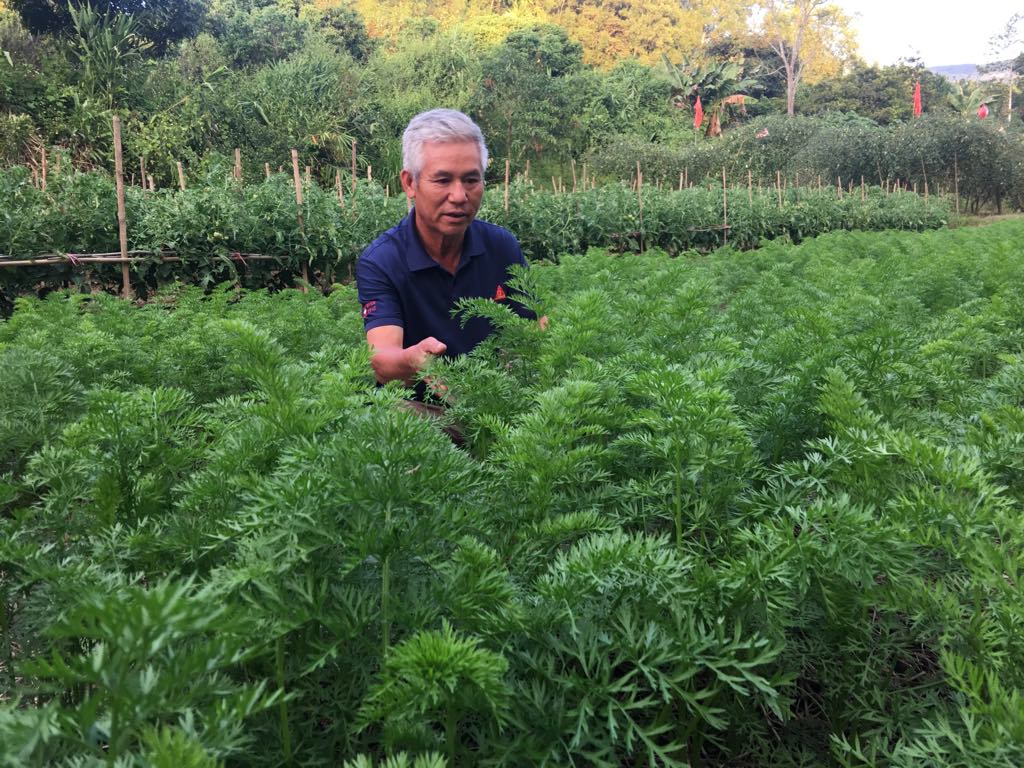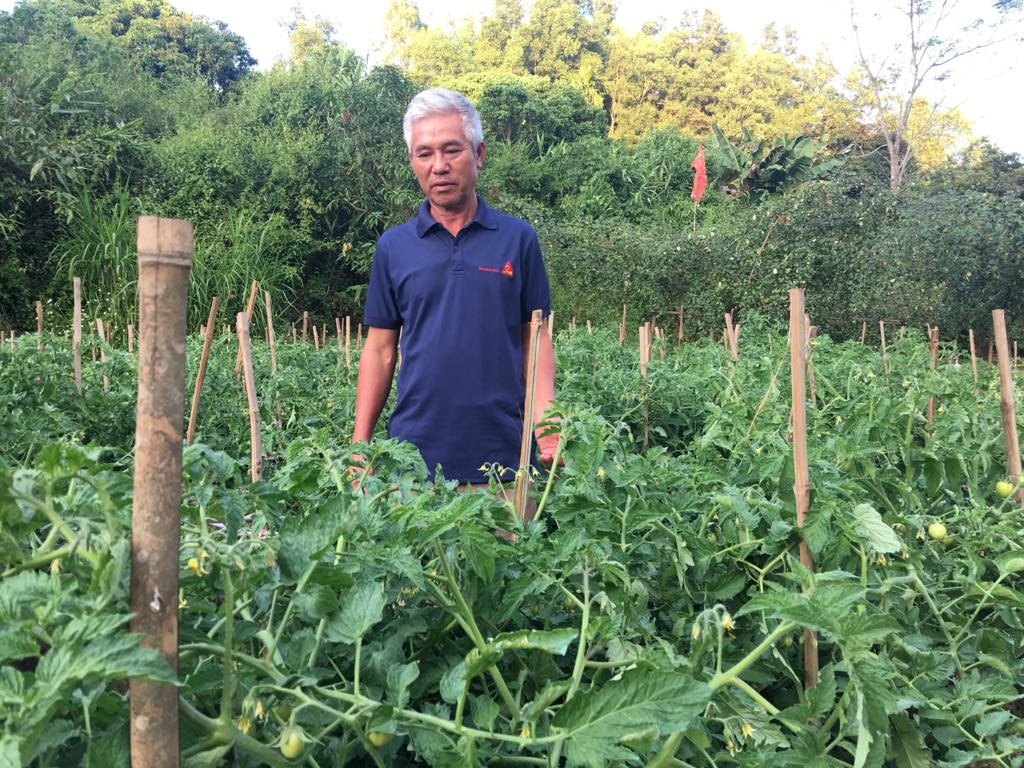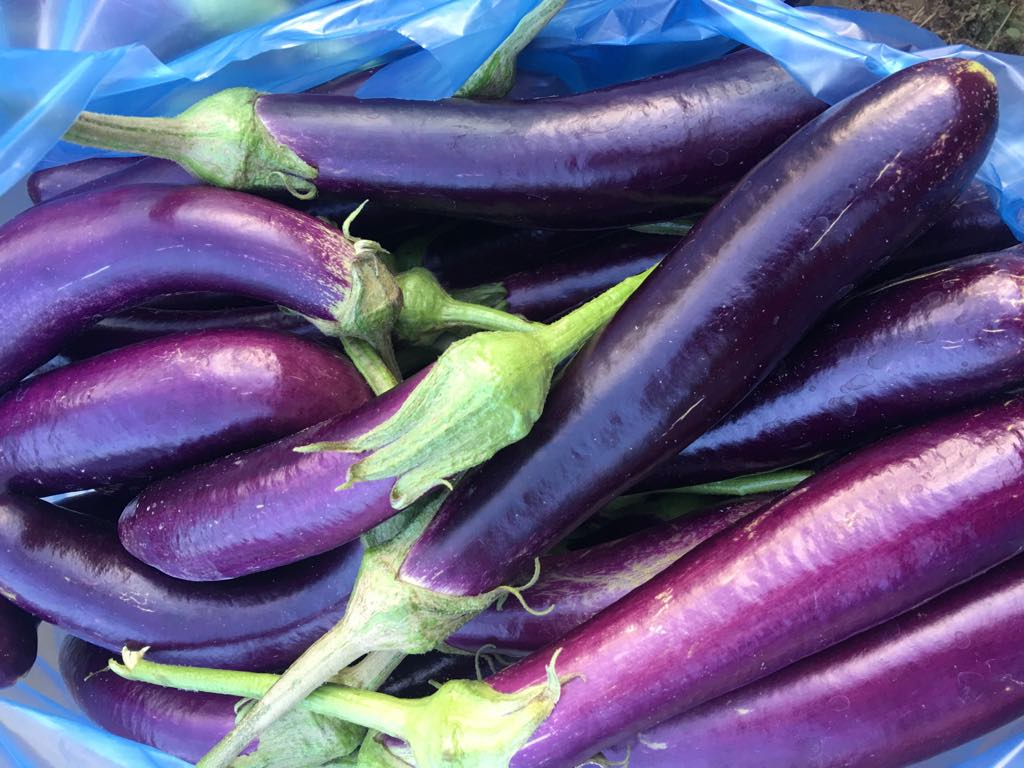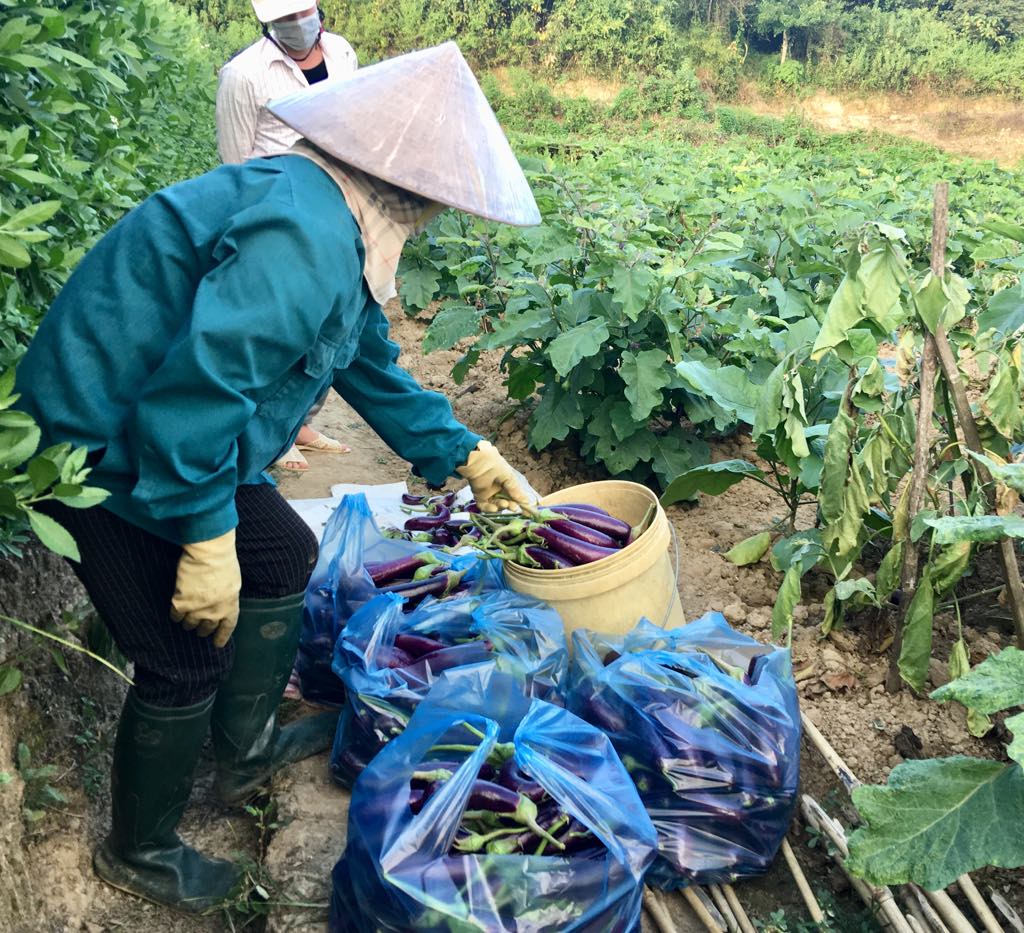In addition to its goal of protecting the environment and consumers' interests, the cooperative also collaborates with businesses to grow safe vegetables to sell to provinces and cities, earning billions VND in profits for its members.
Under the guidance and technical transfer of the Dien Bien Department of Agriculture and Rural Development, nearly 30 households in groups 8 and 10, Thanh Xuong commune converted more than 20ha of inefficient 1-crop rice cultivation land to VietGAP vegetable land in 2012. However, after only 1-2 years of conversion, the difficulties in promoting and introducing products to consumers, the time and effort required for care, the low cost of products, and the difficulty in pest control caused many households to return to traditional vegetable cultivation.
 According to Mr. Nguyen Huu Tan, Director of the Safe Vegetable and Fruit Cooperative in Thanh Dong Hamlet, in addition to the goal of protecting the environment and protecting the interests of consumers, growing vegetables under VietGAP standards also aims to associate with safe vegetable product enterprises to export to the provinces, stabilize output and increase income for members.
According to Mr. Nguyen Huu Tan, Director of the Safe Vegetable and Fruit Cooperative in Thanh Dong Hamlet, in addition to the goal of protecting the environment and protecting the interests of consumers, growing vegetables under VietGAP standards also aims to associate with safe vegetable product enterprises to export to the provinces, stabilize output and increase income for members.
Only 9 out of 30 households have so far maintained a VietGAP vegetable garden covering over 7ha and created the Thanh Dong safe vegetable and fruit cooperative. To sustain output and boost its member income, the cooperative partners with businesses each year to produce hundreds of tons of fresh veggies for the market.
Mr. Nguyen Huu Tan, Director of Thanh Dong Safe Fruit and Vegetable Cooperative said: “After many years of shifting inefficient rice cultivation areas to growing corn, potatoes and watermelons with unsatisfactory results. When shifting to short-term vegetables and crops, they grow, yield well, and are well-suited to the climate and soil conditions here.
Since then, everyone has switched to growing veggies from September through April of the following year. Vegetables, tubers, and fruits that we farm in accordance with VietGAP guidelines are very safe for consumers.”
"Growing vegetables in accordance with VietGAP standards is not difficult because compliance with the procedure and techniques would considerably lower the cost of fertilizers and pesticides." Mr. Nguyen Huu Ly, a cooperative member, shared
Many households are hesitant and encounter difficulties when switching to growing safe vegetables in accordance with VietGAP standards because they have been accustomed to the traditional method of growing vegetables for a very long time. This requires compliance with specific procedures and techniques. Therefore, the majority of the households were unsuccessful, frustrated, and gave up after obtaining technical instruction, counseling, and taking part in multiple crops. They believe that this new method of growing vegetables is difficult to implement, even though the vegetables are fresh, if they are not routinely treated with chemical fertilizers or sprayed with pesticides to ward off pests and diseases, the yield is low, the vegetables' appearance is poor, and it is difficult to sell the vegetables. "," Mr. Tan remarked.

Members earn an average of VND 150-170 million VND per crop when they collaborate with enterprises to grow safe vegetables.
Mr. Tan and his wife have struggled for many years to find ways to get rich and achieve sustainable economic development after moving here to reclaim and settle down from Thai Binh province. "Despite settling down in the mountains, I always think about how the people in my homeland grow vegetables to be well-off," Mr. Tan said. They grow fresh vegetables using only river water and rotten organic fertilizers, but the vegetables are still green all year and are in high demand. Growing unsafe vegetables, I've always thought, is no different than poisoning others with pesticides..."
Mr. Tan claims that he and his family not only pioneer in growing VietGAP vegetables, but also mobilize cooperative members to strictly adhere to the safe vegetable production process, putting quality and consumer trust first...
Mr. Nguyen Huu Ly, a cooperative member who has grown nearly 5,000m2 of safe vegetables for the past six years, stated, "Actually, growing VietGAP vegetables is not as difficult as people think. If you successfully complete the first stage and adhere to the principles and care processes, you will undoubtedly succeed and earn an income from 1 vegetable crop equal to 3 rice crops.”
In addition to supplying the market demand in the province, fresh vegetable products are also provided to export enterprises
There is an adage "Practice makes perfect," Mr. Ly's VietGAP vegetable growing method has now been refined into a skill, expertise. Mr. Ly is able to identify the diseases that the vegetable field is afflicted with, their life cycles, and the best ways to prevent and treat them effectively, only by keeping track of the time and studying the field.
According to Mr. Ly's experience, vegetables, tubers and fruits such as: tomatoes, pumpkin, cabbage, carrots… are very easy to grow. Understanding the cycle and weather changes that make vegetables susceptible to illnesses, as well as when to prevent them, is critical. Tomato plants that are 1.5 months old, for example, are extremely susceptible to fungal infections and Pseudococcidae. When pests are identified, spraying them in the afternoon is more effective.
 According to Mr. Tan, the cooperative's vegetable products always assure food safety and hygiene, which is why they are always sold out, the quantity is enough to supply the market.
According to Mr. Tan, the cooperative's vegetable products always assure food safety and hygiene, which is why they are always sold out, the quantity is enough to supply the market.
Mr. Nguyen Huu Tan, Director of the Cooperative added that since 2016, the cooperative has cooperated Dien Bien Safe Green Food Co., Ltd for producing safe vegetables, tubers and fruits with an output of nearly 300 tons/year, generating nearly VND 1 billion in revenue for members. In 2018, the company expanded its production scale and products, so at the start of the season, the company signed a consumption contract for tomatoes, cabbage, pumpkin, etc. More than VND1 billion in total contract value.
“In addition to cooperating with the Company in vegetable production, the members of the cooperative also provide a large number of fresh vegetables to the market in the province and earn a stable and much better income than growing rice because of their average income from 1 vegetable crop is VND 150-170 million” claimed Mr. Tan.
Vinh Duy - Nam Huong (Dan Viet)